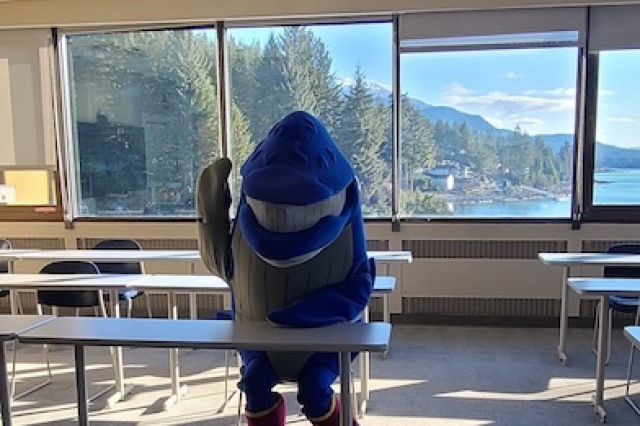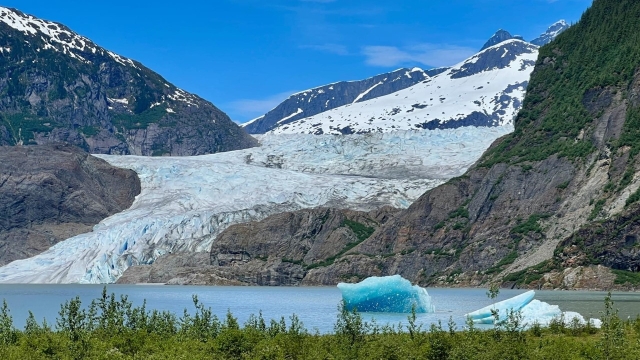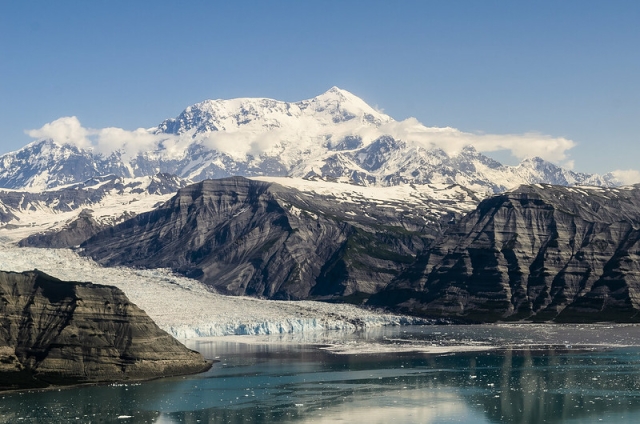“Not everything that is faced can be changed; but nothing can be changed until it is faced.”
-James Baldwin
Facing Change: Communicating Climate Connections In Coastal Alaska |
|
Tuseday October 31st - Thursday November 2nd, 2023 |
| Juneau, Alaska |
Earth to Sky Coastal Alaska Course and Community of Practice: A Regional Approach
There’s never been a better time to engage your visitors, staff, and communities about the impacts and implications of climate change in Coastal Alaska. Join with colleagues in a supportive community of practice to learn about the science of climate change and share best practices in climate communication.
The Facing Change: Communicating Climate Connections in Coastal Alaska course provides you with a foundation in climate science with an emphasis on the connection between global to local processes and on climate impacts in the coastal areas of Alaska. Participants will discuss and practice proven methods for successful climate communication and connect with the growing Earth to Sky community of practice – over 700 communicators and scientists from a variety of organizations improving and sharing their expertise on this topic. You will leave the course armed with knowledge about cutting-edge climate science and a plan for bringing the climate story to your visitors in engaging and inspiring ways.
There are some fabulous presenters lined up, including Dr. Eran Hood, University of Alaska Southeast Professor of Environmental Science; Dr. Michael Loso, Geologist at Wrangell-St. Elias National Park & Preserve; Dr. Kristin Timm, Research Associate at the Alaska Climate Adaptation Science Center at the University of Alaska Fairbanks, National Park Service Interpreters, and more!
- Offered through the Earth to Sky (ETS) NASA-NPS interagency partnership
- No tuition fee
- Travel expenses are the responsibility of participants and/or their institutions.
Course Goal
Our course goal is to inspire courage, hope and action in communicators and visitors to Coastal Alaska by engaging in compelling, clear and concise conversations about the wonders of the environment and the impacts of the climate crisis, in order to increase the resiliency of our communities.
Course Structure
This course emphasizes experiential learning. It starts with a few distance-learning components that participants are required to complete prior to attending the three days of face-to-face sessions in Juneau, Alaska. Participants are expected to be present and fully participate in all the face-to-face sessions. Approximately four months later, a one-hour webinar will be held for participants to share progress and challenges and receive feedback/assistance in executing their action plans. The collegial atmosphere of this course provides participants with many opportunities to engage with scientists, communication practitioners, and colleagues in collaborative learning.
Face-to-Face Sessions in Juneau
- NASA scientists and other national agencies will present climate science in both global and regional contexts followed by discussion sessions to apply that content in participants’ work setting.
- A field trip to the Mendenhall Glacier Visitor Center will explore how to engage visitors in climate science messaging in a wide variety of ways.
 Dedicated time to work with colleagues, coaches, and experienced mentors as part of a regional community of practice to create an action plan for developing a product or program applying course content for use in their site or organization. Participants are encouraged to reach out to internal and external communities as they execute these action plans.
Dedicated time to work with colleagues, coaches, and experienced mentors as part of a regional community of practice to create an action plan for developing a product or program applying course content for use in their site or organization. Participants are encouraged to reach out to internal and external communities as they execute these action plans.- Opportunities to meet and talk with world-class climate scientists, including NASA scientists studying changes in Coastal Alaska.
- Learn climate change communication best practices through presentations from ETS alumni.
- Practice selected communication methodology appropriate to participants’ work settings.
- Sessions held at the University of Alaska Southeast campus Glacier View Room.
Preliminary Assignments
These will be referred to and used during the face-to-face sessions.
- Complete on-demand web-based module on Earth system science (1-2 hours)
- View climate science essentials videos: Carbon Cycle, and Energy Budget (1 hour)
- Conduct interview with subject matter expert about climate using provided outline (1 hour)
- Read short excerpt from CRED Psychology of Climate Change Communication (20 min)
- Read excerpt from the Norms of Collaboration (30 min)
- Read article about Communities of Practice
To access the preliminary assignments, register for a free account on Earth to Sky. After your account has been approved by an administrator, you will be able to access the preliminary assignments.
Photo credit: NPS/Jamie Hart
Course Objectives
Upon completion of the course, participants will be able to:
- Design and execute an action plan to collaboratively produce a climate change education, outreach, and/or interpretative product/program.
- Engage with the Earth to Sky community, both regionally and nationally, to exchange ideas and expertise and to facilitate implementation of their action plan.
- Using an Earth Systems Science approach, describe at least one connection between global, regional, and local Earth processes affecting climate in their region.
- Describe the significance and implications of environmental change in their region to society and natural systems.
- Describe how global climate-related changes in ecosystems, economies, or society may impact their region.
- Choose suitable communication strategies for a particular audience based on available audience research and engagement with their audience.
- Use engaging, audience-appropriate communication techniques, such as metaphor, analogy, visual imagery, storytelling, dialogic questions, or co-creation of knowledge in their product/program.
- Select relevant, audience-appropriate NASA science content and/or educational/visual elements to use in their product/program.
- Identify and access credible sources of accurate and timely climate change science relevant to their region/site.
About Earth to Sky
Earth to Sky (ETS) is an ongoing and expanding partnership between the National Aeronautics and Space Administration (NASA), the National Park Service (NPS), and the US Fish and Wildlife Service (USFWS) that enables and encourages interpreters, educators, and science communicators to access and use relevant science, data, and educational and outreach products in their work. Since 2008, the partnership has conducted many professional development events on the topic of climate change. https://www.earthtosky.org
Who Should Attend?
Experienced interpretive staff, education specialists, tourism industry communicators, public affairs officers, and any other experienced non-formal educators from the private or public sector interested in collaborating with others to communicate about climate change. Those that are interested in climate change research and communication in coastal Alaska. Coastal Alaska includes the communities, lands, waters, glaciers, coastal forests, and ocean ecosystems of south central and southeast Alaska, bounded and encompassed by the Alaska coastal mountain range. Geographically, this reaches from the Kenai Peninsula through the Alaskan panhandle.

Requirements
To attend this course, participants should have prior experience in communications (i.e., interpretation, environmental education, outreach, and/or public affairs). Individuals must complete the Application Form illustrating their interest and experience in climate change communications. Experience or knowledge of climate science is not a prerequisite.
Expectations of Participants
- Complete ~4 hours of preliminary assignments outlined above in preparation for the face-to-face sessions.
- Be present and fully participate in all three days of face-to-face sessions.
- Create an Action Plan for developing an interpretive, educational or outreach product or program applying course content.
- Within one year, produce and share with the ETS community, a synopsis of an implemented interpretive/educational/outreach product incorporating NASA science content.
- Participate in post-course reporting and evaluations, including a one-hour follow-up webinar with fellow course participants.
Selection Process
The course planning team will carefully review and make selections based on information provided in your Application Form. The maximum class size is 24. Those not selected during the first round will be placed on a waitlist to backfill any cancellations.
How to Apply
Apply here!
Applications will be accepted until the end of the day on Wednesday, September 6th, 2023.
Cost
No Tuition. Travel expenses are the responsibility of participants and/or their institutions. A 20-room block of rooms is set aside at the Best Western (907.789.5005) for a discount of $119.95/night.
Questions?
For more information, please contact us at: This email address is being protected from spambots. You need JavaScript enabled to view it.
Download this announcement as a PDF.
Photo credit for cover image of Mount St. Elias & Icy Bay: NPS/ Bryan Petrtyl.

